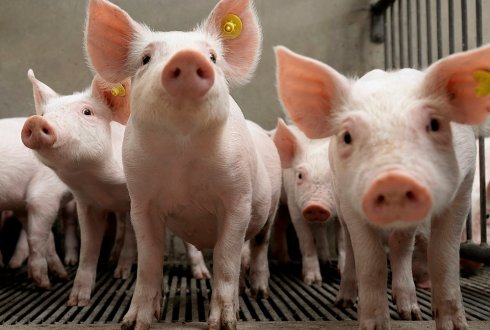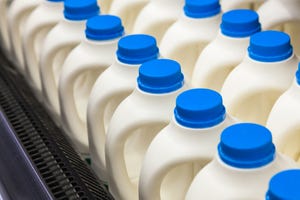The results of this study contradict previous reports indicating swine are not susceptible to SARS-CoV-2 infection.

Severe acute respiratory syndrome coronavirus 2 (SARS-CoV-2), the agent that causes coronavirus disease, has been shown to infect several species. The role of domestic livestock and associated risks for humans in close contact with food production animals remains unknown for many species. Determining the susceptibility of pigs to SARS-CoV-2 is critical to a One Health approach to manage potential risk for zoonotic transmission.
Work by Brad S. Pickering of the University of Manitoba, Greg Smith, Mathieu M. Pinette, Carissa Embury-Hyatt, Estella Moffat and Peter Marszal of the Canadian Food Inspection Agency and Charles E. Lewis of Iowa State University has shown that pigs are susceptible to SARS-CoV-2 after oronasal inoculation.
Among 16 animals, the researchers detected viral RNA in group oral fluids and in nasal wash from two pigs, but live virus was isolated from only one pig. Antibodies also were detected in only two animals at 11 and 13 days post-inoculation but were detected in oral fluid samples at six days post-inoculation, indicating antibody secretion. The results of this study contradict previous reports indicating swine are not susceptible to SARS-CoV-2 infection.
SARS-CoV-2 causes coronavirus disease (COVID-19) in humans; symptoms can range from asymptomatic to mild or severe, including severe respiratory distress and sometimes death.
“Detection of natural infections sheds light on knowledge gaps in SARS-CoV-2 transmission and raised concerns of amplifying or reservoir hosts. In turn, clarification of wild and domestic animal susceptibility can help us assess their potential roles in and risks for transmission to prevent future disease spread. Domestic swine, one of the most highly produced agricultural species, previously have impacted public health. Backyard, small stakeholder animal production has increased in both rural and urban environments and provides a source of high-quality protein and income in these areas, but the practice also can serve as a source for zoonotic disease; therefore, the potential role of pigs in the spread of SARS-CoV-2 should be investigated. Recent evidence for involvement of production animals in SARS-CoV-2 transmission was highlighted in the Netherlands, where anthroponotic transmission from humans to farmed mink was proposed with subsequent zoonotic transmission to >2 humans from mink. That case further exemplifies the need to identify the potential role of production animals in disease transmission,” the researchers noted.
“Previous studies did not detect RNA in swabs or organ samples, and no seroconversion was measured. Infectious dose, viral isolate, age, and breed or colony of swine could affect study outcomes. Of note, we used a 10-fold higher viral dose for experimental infection than was used in previous studies. Moreover, we obtained animals from a high health status farm in Manitoba, rather than a specific pathogen–free colony, to determine the risk to farmed pigs in Canada. Altogether, these findings indicate that further investigations into the susceptibility of additional domestic livestock species should be conducted to assess their risk for infection and zoonoses. Finally, we emphasize that to date no SARS-CoV-2 cases among domestic livestock have been documented by natural infection; however, the results of this study support further investigations into the role that animals might play in the maintenance and spread of SARS-CoV-2,” the researchers said.
The researchers said these data highlight the need for additional livestock assessment to determine the potential role of domestic animals in the SARS-CoV-2 pandemic.
For more information:
Pickering B, Smith G, Pinette M, Embury-Hyatt C, Moffat E, Marszal P, Lewis C. Susceptibility of domestic swine to experimental infection with severe acute respiratory syndrome coronavirus 2. EID Journal. 2021 Jan. https://dx.doi.org/10.3201/eid2701.203399
About the Author(s)
You May Also Like



